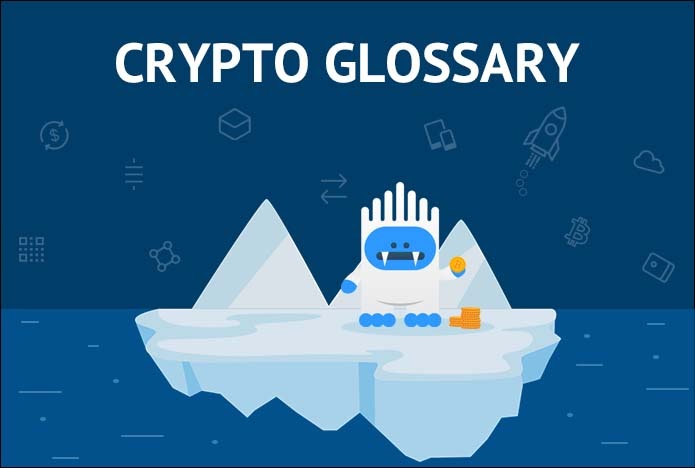Cryptocurrencies have taken the world by storm, with many people eager to get in on the action and invest in these digital assets. However, the world of cryptocurrencies can be confusing, with a plethora of terms and jargon that can be hard to understand. To help you navigate this complex world, we've compiled a list of 50 must-know crypto terminology that will help you make informed decisions about your investments.
50 Must-Know Crypto Terminology
Blockchain
A decentralized, digital ledger that records transactions across a network of computers.
Cryptocurrency
A cryptocurrency is a digital asset that uses cryptography for security and operates on a decentralized network.
Bitcoin
Bitcoin is the first and most well-known cryptocurrency, created in 2009 by an anonymous individual or group known as Satoshi Nakamoto.
Altcoin
Any cryptocurrency other than Bitcoin.
Mining
The process of verifying and adding transactions to the blockchain, which is done by powerful computers known as miners.
Wallet
A software program that stores your cryptocurrencies and allows you to send and receive payments.
Exchange
A platform that allows you to buy and sell cryptocurrencies.
Public key
A long string of numbers and letters that identifies a cryptocurrency wallet.
Private key
A secret string of numbers and letters that allows you to access your cryptocurrency wallet and transactions.
Cold storage
The practice of storing cryptocurrencies offline in a secure location, such as a hardware wallet or paper wallet.
Hard fork
A permanent split in the blockchain, resulting in the creation of a new cryptocurrency.
Soft fork
A temporary split in the blockchain, resulting in a new version of the cryptocurrency.
Ethereum
Ethereum is a cryptocurrency that allows for the creation of smart contracts and decentralized applications.
ICO
Initial coin offering, a fundraising event in which a new cryptocurrency is sold to investors.
Token
A digital asset that represents a specific item or service.
Tokenization
The process of representing physical assets, such as real estate or art, in a digital form using tokens.
DeFi
Decentralized finance, a financial system built on blockchain technology that allows for peer-to-peer transactions without the need for intermediaries.
NFT
Non-fungible token, a unique digital asset that cannot be replaced or exchanged for something else of equal value.
Staking
The practice of holding a certain amount of a cryptocurrency in a wallet to support the network and earn rewards.
Proof of Work
A consensus algorithm that requires miners to solve complex mathematical puzzles to verify transactions.
Proof of Stake
A consensus algorithm that allows users to validate transactions based on the amount of cryptocurrency they hold.
Gas
A unit of measurement used in Ethereum to calculate the cost of executing a smart contract or decentralized application.
DApps
Decentralized applications, which run on a decentralized network and use smart contracts to facilitate transactions.
Whitepaper
A document that outlines the details and goals of a cryptocurrency or blockchain project.
Bull market
Bull market is where prices are rising and investors are optimistic.
Bear market
Bearket market is where prices are falling and investors are pessimistic.
Market capitalization
The total value of a cryptocurrency, calculated by multiplying the number of coins in circulation by the price per coin.
Liquidity
The ability of a cryptocurrency to be easily bought and sold on an exchange.
Volatility
The degree to which a cryptocurrency's price fluctuates over time.
HODL
A term used by cryptocurrency enthusiasts to mean "hold on for dear life," or to hold onto one's investments even when the market is volatile.
FOMO
Fear of missing out, a common feeling among investors when the market is rising and they fear missing out on potential profits.
ATH
Stands for "all-time high," and refers to the highest price that a cryptocurrency has ever reached
FUD
Fear, uncertainty, and doubt, a tactic used by some to spread negative information about a cryptocurrency in order to lower its price.
Whales
Large investors who hold a significant amount of a cryptocurrency and can potentially manipulate the market with their trades.
Pump and dump
A coordinated effort by a group of investors to artificially inflate the price of a cryptocurrency and then sell it for a profit.
Shilling
The act of promoting a cryptocurrency in an attempt to increase its price.
Mooning
When a cryptocurrency's price skyrockets, often used in the phrase "to the moon."
DYOR
Do your own research, a reminder to always thoroughly research a cryptocurrency before investing.
KYC
Know your customer, a process used by exchanges to verify the identity of their users.
AML
Anti-money laundering, measures taken by exchanges to prevent the use of cryptocurrencies for illegal activities.
Fiat currency
Traditional government-issued currencies, such as the US dollar or euro.
Hard cap
The maximum amount of funds that can be raised during an ICO.
Soft cap
The minimum amount of funds that must be raised during an ICO in order for it to be successful.
Escrow
A third party that holds funds during a transaction to ensure that both parties fulfill their obligations.
OTC
Over-the-counter, a type of cryptocurrency trading that occurs outside of exchanges.
Limit order
An order to buy or sell a certain amount of a cryptocurrency at a specific price or better.
Market order
An order to buy or sell a certain amount of a cryptocurrency at the current market price.
Stop-loss order
An order to sell a certain amount of a cryptocurrency at a specific price or lower in order to limit potential losses.
Leverage trading
A form of trading in which a small amount of capital is used to control a larger position, allowing for potentially higher profits but also higher risks.
Margin trading
A form of trading in which a trader borrows funds from a broker in order to increase their buying power.
By familiarizing yourself with these cryptocurrency terms, you'll be better equipped to make informed decisions about your investments and navigate the complex world of cryptocurrencies. However, it's important to remember to always do your own research and never invest more than you can afford to lose.








0 Comments